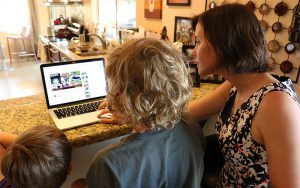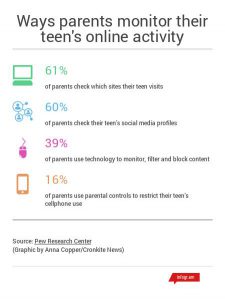- Slug: Children online safety. 1,000 words.
- Video story available
- Photos available (thumbnails and captions below)
- Graphics available (embed codes below)
By ALEXA SALARI
Cronkite News
PHOENIX – School books may be closed for the summer but laptops are open. As children spend more time on the internet, police and parents are working harder to protect them from online predators.
“The way I tell parents, is if somebody knocks at your door and he’s some 45-year-old guy and he says, ‘I just want to come in the bedroom and talk with your daughter,’ would you let him talk with your daughter? Absolutely not,” said Phoenix Police Sgt. Jerry Barker, who leads an Arizona task force to stop cyber-based crimes against children.
The summer break is particularly risky, he said.
“What we do see is more events occurring late at night, when they’re out of school because they can stay up later,” Barker said.
Jamie Winterton, director of strategy for Arizona State University’s Global Security Initiative, is a mother of two young boys, ages 6 and 12. She says teaching kids about online safety is crucial in today’s digital space.
“I grit my teeth,” Winterton said, adding that people tend to think mainly of the good things that come from using technology and sharing information on social media. “But, we should also be more concerned about what baggage does that bring along with it.”
She has good reason to be wary.
In a report from the Arizona Attorney General’s Office, 30 percent of teens ages 13 to 17 have considered meeting someone they have chatted with online. When teens received messages from a stranger online, 40 percent said that they usually reply and chat with that person.
The answer, according to experts, is to teach children how to protect themselves online.
“The number one thing that we need to focus on is education,” Barker said.
What police are doing to teach kids
Law-enforcement officials in Arizona are collaborating to stop people from preying on children. The Arizona Internet Crimes Against Children Task Force, which includes local and state police agencies and the FBI, was launched in 1998. Arrests of online child predators rose from 2011 to 2014.
Another effort teaches families to protect children online.
“We can go out and catch the bad guys all day, but we want to empower the kids and empower the parents so that they have tools in place to protect the children and protect themselves,” Barker said.
The FBI-SOS (Safe Online Surfing) Internet Challenge allows third through eighth grade students to compete against other schools while learning about cyber security through interactive games and videos.
Aside from learning about internet dangers, the anonymity provided to online predators is a major threat to kids.
“The problem is, you don’t know who you’re talking to,” Barker said. “So, the biggest threat is talking with this unknown man, who may be acting like he’s a 13-year-old girl, and all of sudden, now he wants to meet you at the park and next thing you know, you’re kidnapped.”
What one school district is doing to educate students
Jeff Billings, the information technology director at Paradise Valley Unified School District, said the concept of incorporating online safety into the classroom came to him five years ago.
“The more interconnected we become the more, to a degree, the more unstable we become,” Billings said.
The district began teaching it students about digital citizenship two years ago.
Using lesson plans from resources like Common Sense Media, IT specialist Cori Araza teaches students at Paradise Valley High School about digital footprints, online reputation and internet safety.
Students learn basics like Google apps, slideshow technology, programming and coding, along with how to behave ethically online and offline.
“I know of students who have absolutely lost scholarships because of the choices they made and what they put on social media,” Araza said.
“I think students are now getting very afraid of what they’re posting online,” she said. “But, we also want to make sure that we … retain the balance so that they can get the benefits of technology as well.”
Araza’s daughter, Hayden, a high-school student, thinks before she posts.
“The way that I regulate myself is, ‘Can I show this to my grandmother without being embarrassed?’” Hayden said. “If I were to put out this Instagram account or send this Instagram account directly to my boss or somewhere that I want to go to college, a professor, anyone – would I be comfortable standing there and showing them that profile?”
Billings said the district is working with other schools and IT departments across Arizona to help others integrate digital citizenship into classrooms.
What can parents do to protect their children
Parents’ should have regular conversations about online behavior with their child, said Ken Colburn, founder and chief executive of Data Doctors Computer Services. Children exposed to inappropriate material or encounters online will then feel more comfortable telling their parents.
“It’s kind of like waiting until the day before a child gets married to have that birds and bees conversation, that should have happened long ago. You really need to look at this as a long-term process, building relationship,” Colburn said.
Barker suggests kids should not be left alone with a computer in their bedroom.
The state Attorney General report shows 85 percent of harassment initially occurs when a child or teen was logged on at home. That harassment primarily occurring through instant messages, emails and chat rooms.
Colburn suggests using sites like k9webprotection.com and mywot.com to help monitor and filter what your child may be exposed to.
However, he says these are not substitutes for talking to your kids about what they’re doing online.
“It starts with the relationship. I think a lot of people think this is a technology issue. It really isn’t,” Colburn said.
For additional resources about online safety, visit stopthinkconnect.org, a global campaign, in partnership with the U.S. government, that aims to help digital citizens stay safe online.
EDITOR’S NOTE: Sources in the Public Insight Network informed the reporting in this story through a partnership with the Cronkite PIN Bureau. To send us a story idea or learn more, click here.
^__=
Graphic embed code on arrests:
<iframe id=”datawrapper-chart-vmyXU” src=”//datawrapper.dwcdn.net/vmyXU/3/” frameborder=”0″ allowtransparency=”true” allowfullscreen=”allowfullscreen” webkitallowfullscreen=”webkitallowfullscreen” mozallowfullscreen=”mozallowfullscreen” oallowfullscreen=”oallowfullscreen” msallowfullscreen=”msallowfullscreen” width=”100%” height=”450″></iframe><script type=”text/javascript”>var embedDeltas={“100″:739,”200″:569,”300″:494,”400″:477,”500″:450,”600″:433,”700″:433,”800″:433,”900″:433,”1000”:433},chart=document.getElementById(“datawrapper-chart-vmyXU”),chartWidth=chart.offsetWidth,applyDelta=embedDeltas[Math.min(1000, Math.max(100*(Math.floor(chartWidth/100)), 100))]||0,newHeight=applyDelta;chart.style.height=newHeight+”px”;</script>
internet safety video embed:
<iframe width=”560″ height=”315″ src=”https://www.youtube.com/embed/Qubih-AZYkU” frameborder=”0″ allowfullscreen></iframe>



